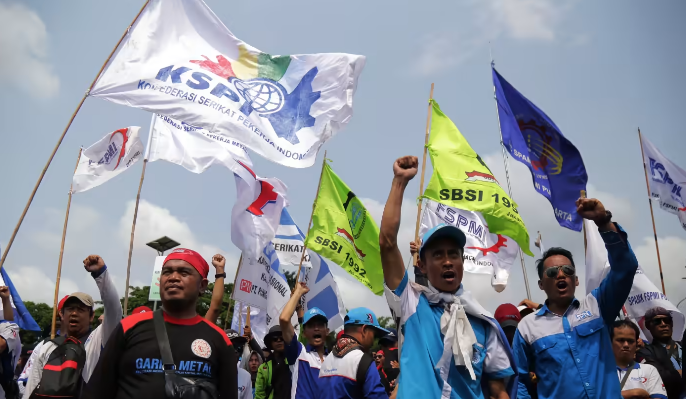- info@ghrd.org
- Mon-Fri: 10.00am - 06:00pm
The Indonesian “Omnibus” Law and its repercussions on Labour and Indigenous Rights

The Indonesian “Omnibus” Law and its repercussions on Labour and Indigenous Rights
Photo Source: © Anadolu Agency/Getty Images, 2020
29-08-2023
Anasuya Virmani and Maggie McCoy
Southeast Asia and Pacific Researchers,
Global Human Rights Defence.
Introduction
The “Omnibus” Bill, passed on October 5, 2020 by Indonesia’s government, has caused an uproar throughout the country since its introduction to the public. According to Indonesian president Jokowi Widodo, the purpose of the bill is to create a better law for job creation, including enabling easier access for multinationals and international businesses to the Indonesian labour market. However, the bill also has a repealing effect: it reduces existing labour rights, such as the 2003 labour law. Moreover, the new bill has largely weakened existing legal rights such as maternity benefits, minimum wage, child benefits, protection of Indigenous rights and other legal protections in the case of labour and environmental laws (Human Rights Watch (HRW), 2020). This article will give an overview of the “Omnibus” law and its public response. Secondly, it will explore why the framework was deemed unconstitutional by the Indonesian Constitutional Court. This article will then demonstrate what the change in law means for workers and Indigenous communities in Indonesia, and lastly, it will summarise previous points and give a short outlook on what the “Omnibus” law might mean for Indonesia’s future.
What is the “Omnibus” law?
The Indonesian Law on Job Creation, also widely called “Omnibus Law”, was drawn up in October 2019 to “simplify the application process for business licences across all business sectors, including land acquisition permits, to create more jobs, boost infrastructure development, and attract foreign investment” (HRW, 2020). When it was passed by the House of Representatives on October 5, 2020, street protests broke out in more than 30 cities, at which hundreds of protestors were arrested, mostly in Jakarta and Surabaya (HRW, 2020). During these protests, up to 28 photographers were physically assaulted or their equipment destroyed, and the police arrested six journalists for 24 hours (HRW, 2020).
The protesters criticised that the 1000-page law had been drafted mostly in consultation with business personnel and multinationals, with minimal consultation with affected groups and labour unions (HRW, 2020). According to Human Rights Watch, the new omnibus bill minimises labour rights and “dismantles environmental protections, including threatening Indigenous people’s access to land and the country’s declining rainforests (HRW, 2020).
Unconstitutionality of the Law on Job Creation
As mentioned above, the new Omnibus law was passed in 2020; however, since the new law for the business sector was announced, many human rights, Indigenous rights and environmental groups have been protesting the new legislation. As said by the General Secretary of the Indigenous Peoples Alliance of the Archipelago (AMAN), Rukka Sombolinggi, “The Omnibus Law bypassed the requirement for people’s consent as well as ignoring ecological, social and cultural aspects, which directly violates the Indigenous people’s rights, in specific, their safety and right to livelihood as now buying land is much easier and disregards ownership from Indigenous people’’ (Barahamin, 2022). AMAN has further stated that the disregard of consent and prior information coming from national strategic projects have evidently ignored the “basic rights of peoples” and that the police forces that have been sent to the regions are “coercive and abusive” (Barahamin, 2022). It has become clear that the Omnibus law was not made to protect the marginalised but to help businesses to come to Indonesia and set up operations here at the cost of human rights.
A petition was made by three civil organisations and three individuals against the “Omnibus” Law No. 11 in 2020, in which they stated that the new law was a step backwards due to it revising old criminal and administrative penalties which punish the usage of customary land rights without prior consent in the business sector (Fachari & Widyatmoko, 2022).
The petitioners made three points; firstly, significant changes were made to the final text after the House of Representatives had already agreed. Secondly, these changes are against principles of legislation such as openness and clarity of purpose. Third, the legislator did not give the public the capacity to shape the new legal framework (Fachari & Widyatmoko, 2022). Hence, the way that the government made and enacted this new legal framework was deemed “conditionally unconstitutional” by the Indonesian Constitutional Court after they had reviewed the law in November 2021 (Barahamin, 2022).
Nevertheless, the law is only temporarily unconstitutional as the government has a chance to remedy the mistakes by remaking the process of law-creation in the next two years. This means that the content of the framework does not have to be renewed, but only the way they have brought the framework into existence. This means that the laws can be modified by remaking the procedural way of the legislation and having improved public participation. If the public has enough demand for certain sections to be changed, the House of Representatives must comply with the public’s demand (Fachari & Widyatmoko, 2022).
Impact of the Omnibus Bill on labour rights and Indigenous groups
With the Omnibus Bill, several new regulations will adversely affect any member of the working class, such as the reduction of protection for workers compared to the 2003 labour law, which strips away the protection on “minimum wages, severance pay, vacation, maternity benefits, and health and childcare” as well as the abolishment of legal protection in permanent contracts (HRW, 2022). As the Omnibus law is only being implemented now, we will have to wait to see exactly how this implementation will look to fully evaluate the impact (Baker & MacKenzie, 2020).
However, it is already safe to say that the job creation law will adversely impact Indigenous peoples’ rights to their “forests, livelihood, food, water, and culture” (HRW, 2020). This is visible in several regulations, for example, the omission of environmental permits, the removal of strict liability and lesser community involvement.
As Baker and MacKenzie state, before the Omnibus law, an environmental permit was necessary to obtain a business licence, as well as before every change of activity or business direction (Baker & MacKenzie, 2020). Under the new law, this permit is integrated into the business licence (perizinan berusaha), which eventually might enable companies only to provide a statement letter ensuring they comply with certain environmental standards instead of the former more common Environmental Impact Analysis Document (AMDAL) (Baker & MacKenzie, 2020). Secondly, the Omnibus bill has made it harder to sue environmental polluters. Opposite to former regulation, stakeholders or impacted parties now must prove that certain environmental damage is the direct fault of the alleged polluter (Baker & Mackenzie, 2020). Thirdly, the former environmental law promoted the consultation of a wide array of stakeholders during the AMDAL preparation stage, such as “affected persons and communities, environmental activists, and parties affected by all types of decisions in the AMDAL process’’ (Baker & Mackenzie, 2020). Therefore, the reduction of this process might lead to less Indigenous consultation before potentially harmful decisions.
Finally, AMAN also criticised the Omnibus bill for contradicting a bill on Indigenous People’s rights and the simplification of the recognition of Indigenous land (HRW, 2020). This bill has been debated in parliament since 2009 but did not pass so far (HRW, 2020).
Conclusion
Indonesia’s non-participatory style of law-making is gravely concerning and needs to be revised. The job creation law, which has been the focus of harsh criticism and was examined by the Constitutional Court and found to be unconstitutional, will remain valid if Indonesia’s lawmakers amend the law until November 2023. This relative win of the government and business sectors against the public and affected groups results in these sectors’ invigoration of such behaviour. Therefore, it is likely that they will continue to push for their interest over the needs of marginalised and civilian communities.
According to an article in the newspaper Kompas from November 28, 2022, there has been a draft of a ‘medical’ Omnibus bill included in the 2023 priority legislation (Putra, 2022). Allegedly, the bill “was created to facilitate foreign investment in the health sector and to make it easier for foreign doctors and health workers to enter the country” (Putra, 2022). The draft is strongly rejected by medical professionals and staff, as it, just like the first Omnibus bill for job creation, was drafted non-transparently and non-participatory and thus does not comply with the procedure, as none of the stakeholders nor the public has been involved (Putra, 2022).
While developments such as the job creation law and the new medical bill draft are concerning for any member of the Indonesian working class as they have been set up without any transparency, it is to await how much of a graver impact the law will have on Indigenous and forest communities.
Search
ABOUT US
Global Human Rights Defence (GHRD) is a dedicated advocate for human rights worldwide. Based in The Hague, the city of peace and justice. We work tirelessly to promote and protect the fundamental rights of individuals and communities. Our mission is to create a more just and equitable world, where every person's dignity and freedoms are upheld. Join us in our journey towards a brighter future for all.
ALL CONTACTS
-
Riviervismarkt 5-unit 2.07
2513 AM The Hague - Phone +31 62 72 41006
- info@ghrd.org
-
10:00am - 06:00pm
Saturday & Sunday Closed
SUBSCRIBE
Stay informed and be part of change - Subscribe to our newsletter today!
- Copyright of GHRD 2023. Powered by Desmantle Studio.


Leave a Reply